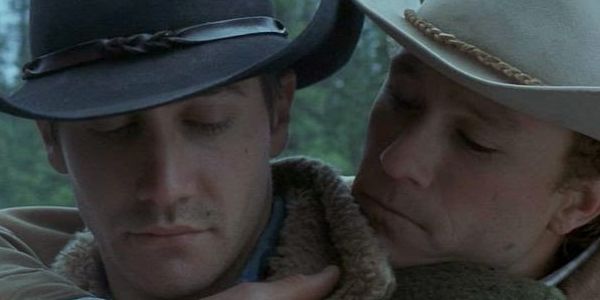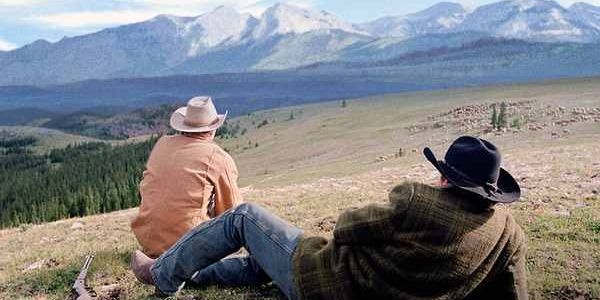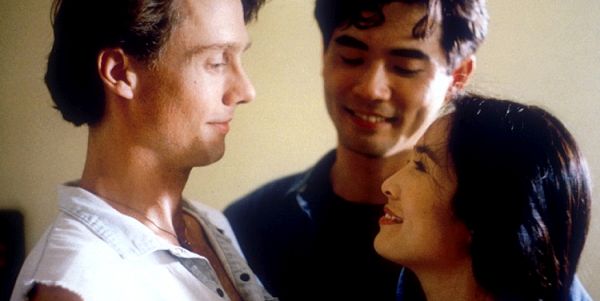The Problems With Ang Lee’s Gay Couple Films

Andrew Emerson is a University of Chicago student. His high…
Over the course of his career, Taiwanese-born director Ang Lee has made two films that feature gay couples as protagonists. The better-known of the two, Brokeback Mountain (2005), tells the story of Jack and Ennis, two cowboys from Wyoming who engage in an on-and-off relationship over the span of two decades. Conversely, Lee’s earlier “gay couple film,” The Wedding Banquet (1993), follows Wai-Tung, a Taiwanese-American landlord who tries to conceal his sexuality and boyfriend from his parents by marrying – and accidentally impregnating – one of his female tenants.
These two films both have a lot going for them, particularly when it comes to their acting. Yet both of them also have significant flaws that hamper their attempts to offer empowering, meaningful depictions of gay characters. On the one hand, Brokeback Mountain adopts an inconsistent attitude towards sexuality, alternating between approval and disgust. Meanwhile, The Wedding Banquet heteronormalizes its narrative by both watering down its protagonists’ gay identity and sexualizing a straight woman.
Brokeback Mountain’s Contradictory Attitude Towards Sex
Let’s start with Brokeback Mountain. In terms of its narrative, one of the film’s overarching “messages” is that sexuality should be appreciated rather than condemned or repressed. Broadly speaking, this idea finds expression in the character of Ennis. Despite his love for Jack, Ennis refuses to fully commit to their relationship because of the shame, disgust, and fear that he feels vis-à-vis his sexuality. Ultimately, this unwarranted hesitance is the main reason why their love story ends on a tragic note.

In highlighting the negative consequences of sexual repression for Ennis, Brokeback Mountain implies that sexuality is something that ought to be celebrated and valued instead. Yet what’s frustrating about the film is that this affirmative view of sexuality is undermined by how the film’s sex scenes are shot. Although they involve different characters and settings, these scenes invariably have stylistic features – dark lighting, no background music, an emphasis on grunting and panting noises – that make sex seem ugly and impersonal, as though it were the act of mere animals who needed an outlet for their hormones.
To be sure, you could argue that all of these sex scenes need to be considered in context. Most of them involve straight sex – namely, sex that Jack and Ennis have with their respective wives – and in the film’s one and only gay sex scene, Jack and Ennis are both drunk. In the case of the straight sex, you could say that the scenes’ ugliness merely illustrates the fact that neither Jack nor Ennis has a fulfilling marriage in the first place. And in the case of the gay sex, Jack and Ennis’ drunkenness would seem to explain why their sex doesn’t look particularly elevating.
Ultimately, however, such narrative context doesn’t change the fact that Brokeback Mountain’s depiction of sex is problematic. For starters, the fact that all of the film’s sex scenes occur in the context of broken or nonexistent emotional relationships begs the question: why isn’t Lee interested in showing sex scenes in the context of emotional intimacy? It’s not like the narrative lacks such intimacy: Jack and Ennis have a lot of loving moments, and initially, they both seem to at least believe they’re happy with their respective wives.
The film condemns the idea that sexuality is something to be ignored or “hushed up.” But by limiting itself to sex scenes in “ugly” contexts, it fails to provide a positive, concrete alternative to this negative view of sexuality, and it thereby allows the viewer to draw an implicit link between sex and a lack of emotional intimacy.

Even if you don’t want to criticize Brokeback Mountain for something it doesn’t do, moreover, the fact remains that it retains a negative view of sex even in scenes that have no narrative-based justification for making sex seem “ugly.” Here’s an example. Just over a half-hour into the film, there’s a scene in which Ennis enters his and Jack’s tent, where Jack has been lying shirtless on the ground. Over the course of the next minute, the two of them go on to do a fair number of physically intimate things, like kissing and cuddling. But soon after Jack is shown moving on top of Ennis – presumably to have actual sex – the camera conspicuously cuts away, first to a brief close-up of them simply kissing and then a completely different scene altogether.
Unlike with the aforementioned sex scene between Jack and Ennis, this intimate scene can’t be said to occur in an “ugly” narrative context. Aside from the fact that neither of them is drunk – their decision to get intimate, in that sense, is deliberate and consensual – the scene comes right after Jack and Ennis openly acknowledge their feelings for one another. Moreover, the scene’s stylistic features – in particular, the wistful guitar music playing in the background – indicate that its intentions are romantic, that it aims to showcase the joy and comfort that Jack and Ennis feel when they’re with each other.
With what it chooses to show and not show in this romantic context, however, this scene ultimately, ironically espouses a prudish attitude towards sex. On the one hand, the camera is obviously comfortable with showing things like kissing and cuddling. While such behavior is certainly laced with sexual undertones, it’s more in keeping with popular, desexualized notions of what love and “romance” look like. After all, as anyone who grew up on Disney films knows, there are tons of desexualized movies in which the characters passionately kiss or closely embrace.
Conversely, it’s telling that the camera cuts away when Jack and Ennis start full-on sex. Given how ugly the film’s actual sex scenes are, you get the impression that the camera is cutting away for fear of “ruining the mood.” In other words, it seems to be turning away from something it finds inherently disgusting and anti-romantic – as though any depiction of actual sex would prevent us from appreciating the emotional and spiritual bond that Jack and Ennis have formed.
On the whole, then, Brokeback Mountain’s attitude towards sex is defined by a fundamental contradiction. Through its storyline, the film advances the idea that sex and sexuality are important, constructive, and nothing to be ashamed about. But its depictions – and conspicuous non-depictions – of sexual intercourse conversely suggest that sex is bestial, unromantic, and symbolic of emotional distance. Ultimately, these sex scenes’ conservative outlook frustrates the overall film’s efforts to offer a liberal, understanding portrayal of a gay relationship.
The Wedding Banquet’s Heteronormativity
The issue with The Wedding Banquet, meanwhile, is that it caters to an audience with a heteronormative worldview – specifically, an audience that skews white, heterosexual, and upper middle class. At the film’s start, Wai-Tung is depicted in a way that such an audience would consider “respectable”: he dresses immaculately, has a well-paying white-collar job, and lives in a comfortable two-story house. Meanwhile, more potentially discomfiting aspects of his and his boyfriend Simon’s lives – for instance, Simon’s participation in ACT UP, or their VHS copy of Todd Haynes’ Poison – are downplayed, to the point that, like me, you’d probably have to conduct a meticulous, shot-by-shot analysis of the film to notice these details.

The heteronormative mentality of The Wedding Banquet, moreover, becomes especially apparent in the way Lee sexualizes Wei Wei, the straight woman whom Wai-Tung ends up marrying and accidentally impregnating. In a not-so-subtle attempt to present her as “sexy,” the first shot we get of Wei Wei is a medium close-up in which she’s shown washing her upper back, all while a love song by a well-known Taiwanese singer loudly plays in the background. Later, in another medium close-up that’s probably the most sexually explicit moment in the film, a naked Wei Wei is shown climbing on top of Wai-Tung in order to (as she puts it) “liberate” him.
Contrast this titillating depiction of Wei Wei with how The Wedding Banquet depicts Wai-Tung and Simon. For most of the film, Simon and Wai-Tung don’t engage in any significant form of physical affection beyond an occasional, desexualized kiss, hug, or cuddle. And in the few scenes in which they do get rather intimate – midway through the film, for instance, we see them make out and start undressing after they enter their house and close the front door – the camera noticeably remains at a distance from the two of them. Whereas the camera has no problem with sexualizing a straight woman, in other words, it refuses to play up or eroticize Wai-Tung and Simon’s gay intimacy, as though it found such intimacy slightly repulsive.
Altogether, you could say that Wai-Tung and Simon are the gay equivalents of Sidney Poitier’s “whitified” black character in Guess Who’s Coming to Dinner. Their gay identity and sexuality are diluted so that the two of them seem familiar, unthreatening, and palatable to those with a heteronormative outlook. At the same time, despite its ostensible focus on a gay couple, the movie also magnifies the sexuality and sex appeal of a straight woman – again, all in order to pander to a heteronormative worldview. Put simply and crudely, then, The Wedding Banquet is a film about gays for non-gays.
Conclusion
To sum up: Lee has won both awards and critical acclaim for his portrayals of gay couples in Brokeback Mountain and The Wedding Banquet. Yet in spite of their reputations, both films turn out to be flawed. The former’s narrative and style contradict one another on the issue of sexuality. Conversely, the latter heteronormalizes its gay characters for the sake of a non-gay audience. While both of these films certainly have numerous strengths, then, their treatment of sexuality-related issues renders them both somewhat unsatisfying.
Do you agree with me? Why or why not? Please share your thoughts in the comments!
Does content like this matter to you?
Become a Member and support film journalism. Unlock access to all of Film Inquiry`s great articles. Join a community of like-minded readers who are passionate about cinema - get access to our private members Network, give back to independent filmmakers, and more.
Andrew Emerson is a University of Chicago student. His high school English teacher once asked him to read a batch of Roger Ebert’s reviews for class, and he’s been fixated on the idea of writing about movies ever since. You can follow his attempts to pursue this obsession at http://filmwatcher.net/.













